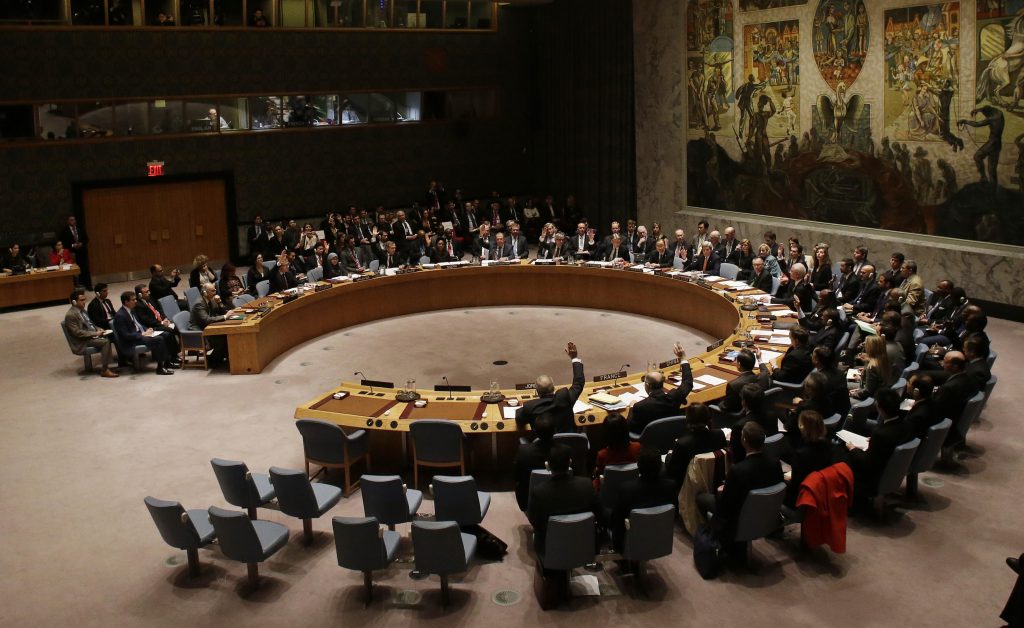Russia and the United States traded vitriolic Cold War-style barbs over Moscow’s military buildup near Ukraine, while some Western leaders launched new diplomatic initiatives aimed at defusing tension and ruling out any notion of a Russian intrusion into its ex-Soviet neighbour.
A two-hour debate at the U.N. Security Council went ahead over the objections of Russia, but adjourned with no action being taken.
Moscow has repeatedly denied it has any intention of invading Ukraine and has stood by its call for the West to extend security guarantees, including an undertaking that NATO will not embark on any further eastward expansion and that Ukraine will never join the Alliance.
U.S. President Joe Biden said last week that such an invasion was “a distinct possibility” sometime in February. NATO and Washington have rejected Moscow’s demands outright but have offered further talks on issues such as disarmament pacts and establishing rules for staging military exercises.
Putin has made virtually no public appearances since the New Year after weeks of public calls for the West to heed his warnings about Moscow’s security preoccupations with Ukraine, which the Kremlin views as a U.S. vassal.
Secretary of State Antony Blinken and Russian Foreign Minister Sergei Lavrov were to hold fresh discussions by telephone on Tuesday. British Prime Minister Boris Johnson was flying to Kyiv for talks.
French President Emmanuel Macron, who has called for European diplomatic initiatives independent of the United States, spoke to Kremlin leader Vladimir Putin for the second time in four days, with both sides undertaking to pursue diplomacy.
Mutual accusations at the U.N.
At the U.N. Security Council, exchanges were similar to furious, no-holds-barred debates held between the two sides during the Soviet era.
“The situation we are facing in Europe is urgent and dangerous,” U.S. ambassador Linda Thomas-Greenfield told the Council in her opening remarks. “Russia’s actions strike at the very heart of the U.N. charter.”
Russia’s deployment, she said, was “the largest mobilisation of troops in Europe in decades…What would it mean for the world if former empires had licence to start reclaiming territory by force? This would set us down a dangerous path.”
Russian Ambassador Vasily Nebenzya said the United States was “provoking escalation” at the border and accused it of hoping Moscow would proceed with an invasion it had no intention of staging.
“You’re waiting for it to happen, as if you want your words to become a reality,” Nebenzya said. The Security Council session, he said, was “particularly hypocritical”.
“It’s the Americans who hold the record for having troop presences outside their territory,” he said. “The military adventures of the U.S. have killed hundreds of thousands of civilians in countries where they were supposed to be bringing peace and democracy.”
Biden, speaking later at the White House, said the United States is pursuing diplomacy, but warned Russia that “we are ready no matter what happens”.
Troops sent to the border and to Belarus
Ukrainian and Western estimates put the number of Russian troops deployed on the border at more than 100,000 – eight years after Moscow seized and annexed the Crimea Peninsula and fomented an armed uprising by its proxies in eastern Ukraine in which some 14,000 have died.
A large Russian military contingent has also been sent to Belarus, Russia’s close ex-Soviet ally, for joint exercises due to take place soon. Russia last week said some of its troops were returning to base, but the numbers involved were not clear.
Putin refuses to discuss security issues with Ukrainian President Volodymyr Zelensky, clearly preferring to deal directly with Washington – he has had two “virtual” meetings with Biden since early December.
Zelensky has in the past week urged his own people to remain calm and Western leaders to tone down talk of an impending invasion, saying it was causing unnecessary tension and hurting his country’s economy. He has said his country is ready for any eventuality – officials in Kyiv deny Moscow’s suggestions that Ukraine is readying a military offensive, with Western help, to recapture separatist-held territory in the east of the country.
“The Kremlin must remember that Ukraine is ready to defend itself. At the same time, we support the need to keep diplomatic channels with Russia open,” Ukrainian Ambassador Serhiy Kyslytsya told reporters at the U.N.
“It is in the interest of everyone to prevent the war or rather to prevent the renewal of an active phase of the military ongoing aggression.”
Britain and the United States have been sending in military equipment to bolster Ukraine’s defence efforts. Germany has added its voice to EU calls for Russian to pull back its troops but has opted not to dispatch weapons, providing other equipment instead.
In statements after their telephone talks, both Macron and Putin welcomed efforts by diplomats within the “Normandy Format” – made up of Russia, Ukraine, France and Germany — to bring their countries’ leaders together to end the conflict in eastern Ukraine’s Donbas region.
Both favoured dialogue in pursuing the “Minsk accords” – two documents aimed at halting the conflict, but subject to varying interpretations. Russia has recently rejected calls for a new summit of Normandy format leaders.
NATO promised at a 2008 summit that Ukraine and fellow ex-Soviet state Georgia would “one day” join the Alliance and has since renewed that pledge – though it is unlikely for some time. Zelensky came to power in 2019 on a pledge to clinch a deal with Putin but in the past year has said that only NATO membership can solve Ukraine’s security problems.

